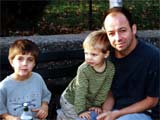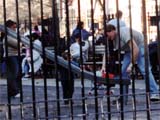|
Talking To Your Child About Terrorism
By Anna Ramos
 When
I came home September 11th, the day of the terrorist
attack on the World Trade Center, I didn't know how
to approach my daughter about it. She's only four, and
so I decided not to say anything to her about it. I
figured there was no way of her finding out. But I was
wrong. The television gave it all away. Every time she
would see the tall buildings in flames and smoke on
the screen, she would ask me questions that I wasn't
sure how to answer correctly. When
I came home September 11th, the day of the terrorist
attack on the World Trade Center, I didn't know how
to approach my daughter about it. She's only four, and
so I decided not to say anything to her about it. I
figured there was no way of her finding out. But I was
wrong. The television gave it all away. Every time she
would see the tall buildings in flames and smoke on
the screen, she would ask me questions that I wasn't
sure how to answer correctly.
Just imagine yourself, at five years of age or so, witnessing a horrendous tragedy like this one. Wouldn't you be afraid? What questions would you have? Would you even understand what was happening? Unfortunately, reality is that thousands of kids were left scared and nervous about their own lives that day, making our jobs as caring parents more difficult.
The first thing we need to know is what to say to make our young children feel they are secure. Dr. Robert March, a psychologist at the department of Applied Psychology at NYU, says "Our children need to know they are safe." Dr. Lynne Beal, a psychologist, says children want to talk about the attack "Kids in every age group are showing a real need to talk about what's going on and to express their feelings about it," she says. She suggests parents should bring up the topic gently and start conversations about the tragedy by finding out what they already know "When you correct these myths, you usually bring it down to a smaller size for the child, making it easier for them to cope," Beal says.
My four year old doesn't have any myths, of course
this is what I think, but if she did the first thing
I would do is tell her the truth to a certain extent.
I'm the type of parent who feels assured that nothing
really serious affects my daughter. This is probably
because I never see her pondering anything. She just
asks one or two questions and then goes on with her
life. So seeing this attitude draws me to think that
the truth will not hurt her. And I'll be honest, she
sat right next to me when I watched the news on television
with all those images that most parents are afraid for
their children to see. She asked me what had happened
to the building and to the people. I told her nothing
but the truth, that the buildings fell on the street
and that many people got hurt and died.
I'm sure my approach to the way I handled my daughter's
questions can be easily argued against. I believe, however,
that children, regardless of age, should understand
that evil acts do happen and that's why we need to take
care of ourselves and of one another. The American Academy
of Pediatrics (AAP) advises parents to help their children
understand that there are "bad" people in the world
doing bad things. Young children should learn about
the good and bad sides of reality, but only to the extent
where the information will not hurt them. And we should
be able to accept that certain experiences will affect
them. When a child is affected directly to a point where
one of his parents have died or the child himself is
injured, then we take greater measures to look for emotional
or psychological help he may need. But when the effect
goes to a limited point where all he needs is his parents'
reassurance and love, I think no parent should become
alarmed. That's the natural cycle of being a human being.
The only way we learn is by allowing certain feelings,
emotions, and experiences to affect us.
 We
shouldn't tell kids about tragedies if they still haven't
been exposed to them because that may be a way of alarming
their innocence and provoking unnecessary worries and
fears . Dr. Rosemarie Truglio, the vice president of
Education and Research for Sesame Workshop, says preschoolers
do not need to know about the event unless they are
accidentally exposed to the news. But I still believe
the truth shouldn't be hidden from young children once
they're aware. We
shouldn't tell kids about tragedies if they still haven't
been exposed to them because that may be a way of alarming
their innocence and provoking unnecessary worries and
fears . Dr. Rosemarie Truglio, the vice president of
Education and Research for Sesame Workshop, says preschoolers
do not need to know about the event unless they are
accidentally exposed to the news. But I still believe
the truth shouldn't be hidden from young children once
they're aware.
Psychologists warn that with broad media coverage children have been too exposed to terrifying images. On the AAP's website, one of the concerns mentioned is that "Overexposure to the media can be traumatizing." Dr. Jeffrey Mitchell, a certified trauma specialist, told CNN he recommends parents to turn the television off and instead read to their children or play games with them.
I disagree with Dr. Mitchell's theory. Young children may not understand the reasons why "bad" people commit horrible acts, but at about 3 or 4 they begin to ask questions out of nowhere and may notice that their parents, whom they trust, are hiding important facts from them, and this, I believe, can be a greater harm to them psychologically.
Overexposing kids to the media is not healthy and parents should monitor what's on television, but it is hard to avoid the images that are repeatedly presented for every eye to see, thus, parents should be prepared with what to say and how to act.
Children pay close attention to their parents' reactions. Every time my daughter saw me upset when watching the horrific images, I noticed she'd begin to feel concerned and start asking questions about what had happened.
We should be extremely cautious of our own reactions
because, even though I don't agree that children should
be totally sheltered from world news, I do believe we
need to control our own reactions so that our children
can feel safe. Exaggeration can lead to stress, which
is harmful in young children. Showing them our calm
and controlled reactions, teaches our children to remain
composed in difficult times.
Parents all think differently, although we do share similar concerns. Our children
all have distinct personalities and reactions to certain
information. There is no "one" perfect approach when
talking to children about terrorist attacks. If we feel
the situation gets out of our control and believe the
child is being harmed, the best thing to do is to call
the doctor or a child psychologist who can professionally
help us. As parents we can only do what we can to protect
and keep them safe.
Have something to say? email
the author
Related Links:
American
Board of Pediatrics
Sesame
Workshop
NYU
Department of Applied Psychology
MSNBC
Parenting
Parenting
Teens
Home | First
Wave | Undertow | Reflections
| Stepping Stones
| Weblogs
Contributors
| About Us | Archive
|

